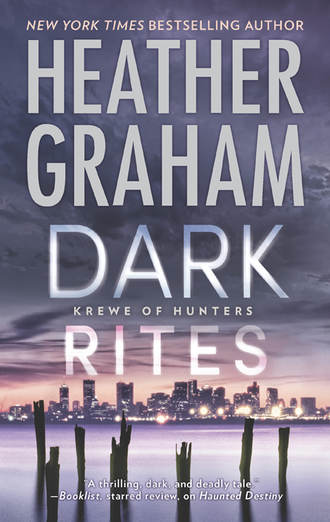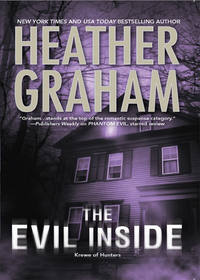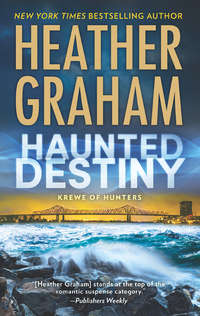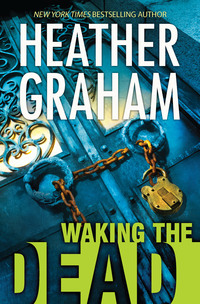
Полная версия
Dark Rites

The witches, they are real...
A series of bizarre assaults is mystifying Boston police: an unknown attacker is viciously beating random strangers and leaving a note quoting an old warning about witchcraft. History professor Alex Maple was one of the victims, and now he’s gone missing. Vickie Preston is certain that someone has taken her friend for malicious purposes. She’s having blood-drenched visions that seem to be staining her waking life, and the escalating attacks suggest that a dangerous cult is at work behind the scenes—a cult so powerful that its members would rather die than be apprehended.
Vickie is grateful to have Special Agent Griffin Pryce and the FBI’s elite Krewe of Hunters on her side. She and Griffin are finding their way in an increasingly passionate relationship, and Griffin is desperately trying to keep her safe and the two of them sane amid the disturbing investigation. The search for Alex will take them deep into the wilderness of Massachusetts on the trail of a serial killer, and it will take everything they have to survive the ancient evil that awakens and threatens not just the man they’re striving to save but their very souls.
Praise for New York Times bestselling author
Heather Graham
“Intricate, fast-paced, and intense, this riveting thriller blends romance and suspense in perfect combination and keeps readers guessing and the tension taut until the very end.”
—Library Journal on Flawless
“Graham is a master at world building and her latest is a thrilling, dark, and deadly tale of romantic suspense.”
—Booklist, starred review, on Haunted Destiny
“A riveting mystery...interesting history, [and a] sweet romance with a second chance at love.”
—Fresh Fiction on Darkest Journey
“Graham is the queen of romantic suspense, and her latest is proof that she deserves the title. What makes this story more fun than most is the relationship between Kieran Finnegan, who wants nothing more than family harmony and a functioning restaurant, and FBI agent Craig Fraiser, who wants justice. Sparks fly, and it’s electric.”
—RT Book Reviews on Flawless
“The Krewe is back! Graham excels at weaving history, finding the proper balance between past and present and keeping a story fresh and authentic, with Haunted Destiny being no exception. The chaos and camaraderie of the characters are captured with vivid detail, and the identity of the killer will keep you guessing until the very end.”
—RT Book Reviews on Haunted Destiny
“Graham stands at the top of the romantic suspense category.”
—Publishers Weekly
“An incredible storyteller.”
—Los Angeles Daily News
Dark Rites
Heather Graham

In memory of two men from Massachusetts.
My uncle George Law.
An amazing in-law I would have been proud to have
as a blood relative, as close and giving and supportive
as any family could be. Kind, generous, wonderful.
A true hero in his strength and kindness.
And my dear friend Dennis Cummins.
Musician, bandmate, Lizzie Borden house protector,
Biography Channel Andrew to my Abby and Chynna Skye’s
Lizzie, amazing friend who quietly made every occasion
together one that made me smile.
I loved them both, and it is true—
the world is a poorer place now that they are gone.
CAST OF CHARACTERS
Victoria (Vickie) Preston—historian and author
Griffin Pryce—special agent with the FBI’s Krewe of Hunters
Jackson Crow—field director, Krewe of Hunters
Craig “Rocky” Rockwell—special agent with
the FBI’s Krewe of Hunters
Devin Lyle—children’s author and Krewe agent
Dylan Ballantine—ghost of a seventeen-year-old boy
who haunts Vickie
Darlene Dutton—ghost of a nineteen-year-old girl
Roxanne Greeley—Vickie’s best friend
Alex Maple—history professor and Vickie’s friend
Milton Hanson—professor
Ron and Cathy Dearborn—local musicians
Isaac Sherman—man whose wife went missing
Law Enforcement
David Barnes—detective with Boston PD
Jim Tracy—sketch artist
Wendell Harper—Massachusetts State Police
Robert Merton—detective from Bristol, Rhode Island
Cole Magruder—detective from Fall River, Massachusetts
Charlie Oakley—retired detective in
Fall River, Massachusetts
Contents
Cover
Back Cover Text
Praise
Title Page
Dedication
CAST OF CHARACTERS
Prologue
Chapter 1
Chapter 2
Chapter 3
Chapter 4
Chapter 5
Chapter 6
Chapter 7
Chapter 8
Chapter 9
Chapter 10
Chapter 11
Chapter 12
Chapter 13
Chapter 14
Chapter 15
Chapter 16
Acknowledgments
Extract
Copyright
Prologue
Alex Maple wasn’t sure, as he first became aware of himself, if he was alive or dead.
He was miserable; he knew that.
Alive—he had to be alive to hurt in so many places.
He hadn’t opened his eyes. Slowly, he tried to do so. At first, he thought about the Undertakers—the duo of kidnapping killers who had recently terrorized Boston. He was probably buried—deep in the earth, in a hole, in a Dumpster, in newly poured roadwork...
No. When he opened his eyes, there was light.
Too much light, maybe. Looking around, he realized that he wasn’t buried. The harsh light of a naked bulb filled the room where he lay.
He tried to move; he sat up. He saw that he was on a gurney. The walls had once been painted that awful sickly green color that graced most of the country’s hospitals. Paint was peeling; dust and dirt covered the floors; spiderwebs were visible around the hanging lightbulb. There were several other gurneys in the large room—four or five of them. Scattered throughout and by the gurneys were tables, some made out of wood, some that appeared to be newer, made of stainless steel.
There were tools on those tables. Knives, clamps, more—instruments that resembled those used by doctors years and years ago, some not so different now. He narrowed his eyes to study the one set.
From the 1800s, so it seemed: bullet extractor, amputation knife, saw, cervical dilator, lithotome, scarficator and trephine, among others he couldn’t quite see.
Surgical instruments—the trephine for creating gouges in the skull.
And the strange shadowy color on some of the tables...
Dried blood.
He quickly turned to look at another table. Instruments for lobotomy, he thought—the controversial procedure invented by a Portuguese neurologist in the 1940s, known to create as many side effects as the initial mental problem, almost stripping the soul from a man.
He tried to rise from the gurney.
It was only then that he realized that he was shackled to it. One huge chain on his left ankle. Another on his right arm.
His heart raced; he couldn’t breathe. It seemed that his vision blurred before him and the world started to go black.
What the hell? What in God’s name had happened to him? Kidnapped, taken, was he going to be killed? Worse—tortured and killed.
The fear was nearly overwhelming!
He fought the sensation. Hard! He didn’t have any kind of training for this type of thing; he hadn’t even been a Boy Scout. But he was bright, and he wanted to survive.
He was—not all that useful in such a situation!—a historian. He had to make do.
Okay, that meant that, at the least, he was pretty darned sure he knew where he was. The Mariana Institute for the Mentally Unfit, opened circa 1840, closed down when the Commonwealth of Massachusetts had approved the disincorporation of several valley towns in order to create the Quabbin, a reservoir of water for Boston, in the 1930s. The Mariana Institute remained on high ground, ground that was deeply forested, now inhabited and visited only by the wildlife that proliferated the area—bobcats, black bears, moose, red foxes, eagles, deer, weasels, coyotes and more.
It was supposed that it existed no more.
But Alex was in it!
According to official records, it—like so many other buildings—had been razed circa 1936.
But clearly it hadn’t been, and he only knew that it was still here because of an obscure reference he had recently found in a book of incredibly boring records. Reading between the lines, he realized that they’d run late with the demolition—a complaint by the man in charge chalked it up to the fact that the doctors had been trying to find new placements for the remaining patients. And no more crews had been sent out after the date that it had been recorded as demolished.
The area was called “the accidental wilderness,” because no one had realized what a reserve they would create when they flooded the towns.
He’d been so excited about what he’d discovered.
He hadn’t been able to wait to...tell Vickie!
The terrible thought filtered in: no one knew it was here. No one would know he was here!
Of course, people hiked along trails that weren’t that far away. There was a visitor center, there were wildlife refuges...
None of them near the site of the abandoned mental institute—which had just been left there as the Commonwealth of Massachusetts dealt with matters far more serious than a derelict building that most people wanted to pretend had never existed. It wasn’t anywhere near any kind of an actual large city, with no real roads left to reach it. The wretched place—known for death and mayhem—was not even up for grabs to the many entrepreneurs who loved to create Halloween horror houses or museums out of such old institutes. Massachusetts had a solid grip on the area.
How the hell had he even gotten here?
He couldn’t remember. He had just woken up and...
Found himself shackled to a table.
Think! he commanded himself. He was supposed to have a brilliant mind. He was one of the youngest professors of history at one of the finest institutes of learning in the United States. That was, of course, why he could figure out where he was.
None of this helped in the least in explaining how he had gotten chained up in a supposedly nonexistent mental hospital!
Remember! Remember where he had been, what he had been doing.
For a moment, his past eluded him. So he went back to the beginning: he’d been born in Auburn, Massachusetts. He’d grown up on State Street. He’d always been a nerd, but thank God, it was okay; time and society—and The Big Bang Theory—had made nerds acceptable. He was a hair over six foot three, but his weight was a mere hundred and eighty-five—no matter what he ate! One of the biggest, toughest football players in the school had been his best friend. He hadn’t been stuffed into school lockers or had his head shoved into the toilet. He’d been treated like some kind of guru, really.
And after high school, Harvard.
Graduation. He’d dated Allie Trent; they’d been a good pair. But Allie had died, way too young, way too smart and lovely, to have been lost so sadly to the horrors of disease. That had been a few years back now. He’d gone on a dating website and had a few okay experiences, but nothing that had touched his heart. He indulged in a moment of regret, missing Allie again. His excursions with the opposite sex since had barely awakened his libido.
Maybe he needed a wilder libido. Not something to worry about now! Focus.
So...
He worked at the college, he came home and he researched historical events and whatever else grabbed his fancy; he loved coffee shops and acoustic music and...
Then he remembered. Three weeks ago, he’d been savagely attacked right in front of his apartment. Struck so violently on the head he’d spent days in the hospital. He’d never known what had hit him. Although he’d been somewhat involved in the Undertaker case, but that situation had been solved. His friend Vickie Preston and FBI Special Agent Griffin Pryce had come to see him in the hospital; they—and the police—were still looking for the attacker or attackers, but they’d discovered nothing so far. But there had been a note left on his battered body.
Hell’s afire and Satan rules, the witches, they were real. The time has come, the rites to read, the flesh, ’twas born to heal. Yes, Satan is coming!
The cops, he knew, had chalked it all up to some gang or even cult, acting out. Especially since he wasn’t the only one attacked; a young woman on Beacon Hill had been struck and left with the same note, as had an older man—one who had barely survived!—in Brookline.
Boston had never been crime-free—not even during the days of the very harsh Puritan laws that had first ruled the Massachusetts Bay Colony.
So far—in this rash of knock-’em-out-and-leave-’em-with-a-Satanic-warning attacks—no one had died. The police did what they could, but maybe they were busier with other murders than they were with the head-knockings by a would-be Crowley-esque cult.
Vickie and her agent friend would be on it, though. He was certain!
Alex had been left hurt but alive. And once he’d healed a bit, he’d looked up the rhyme that had been left on his chest. It wasn’t even original. It had first been used in the 1600s by a man named Ezekiel Martin, the bitter leader of a shunned Puritan group, and then again in the 1800s by a gang of thugs in Fall River; it had been used there again in the 1970s. But there were no known serious Satanic cults holding forth in Massachusetts now—not the kind who drew any attention.
The cops had watched over him for a couple of weeks. In fact, he’d become pretty friendly with the cop assigned to watch him most days. But nothing else had happened. Nothing had been found. He’d gone about his daily routine.
And the city budget hadn’t allowed for police protection for him.
Then there were other victims of other crimes. And life went on.
He’d accepted an invitation to a special art showing; he’d seen the newest superhero movie—he’d gone about life. He even went to see the duo playing at the coffee shop.
That was it!
The coffee shop by Faneuil Hall! He’d gone to sip a cappuccino and listen to a great musical set, a brother and sister with a pair of guitars, lead and bass. A pair of lovely out-of-time hippies, he thought, doing a delightful session of folk music.
Professor Hanson had called him about the paper he would soon be publishing on relationships between the founding fathers. Milton Hanson was a friend—one who was helping him make his position at Harvard permanent. Since Alex had been attacked in the street, with centuries-old Satanic cult words written in bloodred marker on his chest, Professor Hanson had also been trying to help him with research in that direction. But that had little to do with the night...
There had been the music. He loved music!
Then there had been the girl.
The girl! The waitress, who had waited on him even when he hadn’t really needed to be waited on. She’d been great.
He tried to remember what she had looked like. About five-six, a brunette—a bubbly brunette. She worked for the coffee shop, or so he thought. He’d gotten a chair before his drink had been ready. He hadn’t stood at the end of the counter waiting. The girl had brought him his cappuccino. She’d been so cheerful and nice.
He remembered listening until it was late, until even that beloved and heavily trafficked area of Boston had gone quiet. He’d stayed to the last song. He’d been thrilled because—right in the middle of it all—the pretty young singer had come to him and thanked him for being such a great audience member.
He’d stood; he’d gone out to the street...
And then the world had gone dark, and only images had swum before him, the people in line at the coffee shop, the musicians playing, the pretty singer, the bubbly waitress...
Dark had turned to black.
And he had woken up here, chained to the table.
Why?
Who the hell kidnapped a quiet and unassuming professor of history and brought him out here, far from Boston, to an abandoned mental institute in the wilderness? He wasn’t worth anything; he had no fortune. He sure as hell held no state secrets; he knew nothing about anything important. There was absolutely no reason to kidnap him, bring him here.
Maybe someone who was mentally deranged themselves had done this. And they were just going to leave him chained here—leave him to slowly die without food or water, chained to the gurney, rotting away until something found him—a bobcat, a rare mountain lion or a black bear.
Or even the rodents and insects that abounded...
Stop; stop, he told himself.
He was brilliant, or so they said. He should be able to find a way out.
Screw brilliant. He wished he was a mechanic—or a superhero. Yeah, a superhero with the power to break chains.
He studied the metal around his wrist and the chains.
At least he wasn’t a victim of the Undertakers. He wasn’t buried alive; he had plenty of air to breathe.
He thought of Vickie Preston. They had first met at the coffee shop—she had asked for his help. He knew she’d been instrumental in catching the killers who had so recently terrorized Boston and the city’s surroundings.
Nice person, beautiful woman...she’d quickly become a true friend, visiting him at the hospital, working on the history of the note—she’d even gone to a concert with him. She was supposed to have been...
Meeting him! Yes, with a friend! She would know that he wasn’t in the city—because he’d be standing her up!
He could picture her now, emerald green eyes glazed with concern. She’d worry, twirling a lock of long dark hair as she wondered why he wasn’t there. She might even stand—tall and willowy—and pace.
Surely she wouldn’t just think he’d suddenly become rude? Would she somehow know, and start to search for him, would she have any idea...?
She had been working with the FBI. With the agent she’d brought to see him, the one who had probed the note, who had promised that he wouldn’t stop until his attacker or attackers had been found.
He suddenly realized that he was thinking intently.
Find me, Vickie, find me! Find me, find me, find me...
He decided that his IQ statistics were wrong, and that he was an idiot—really, what kind of genius could he be? Did he really think that the woman had ESP and would hop up and send out the troops?
But she saw the dead!
True or not.
He was a scholar. He believed in science but he also believed she spoke to the dead. He had kiddingly accused her of it one day when he’d come upon her and she’d appeared to be talking to herself.
Of course, everyone looked as if they were talking to themselves these days—because they were wired to their phones!
But it had been different with Vickie. The way she’d flushed, the way he’d even felt as if something was there...someone else! He’d been joking, of course, and yet...
He’d never had such a feeling. Naturally, as an academic, he was above such fantasy. And, then again, because he was an academic, he did mull over the concept of memory and self and...
There was so much about her that was extraordinary. He’d seen that when she’d worked with the FBI during the recent rash of murders in the state. He’d seen her incredible mind.
Find me, Vickie!
Maybe, just maybe, she really did talk to the dead, and if that was true, maybe, just maybe, it was possible that she had ESP, too!
He frowned, realizing there was a lump of something in the corner. He twisted around enough to rise and see what it was.
Oh, God.
A body. A human body.
And the head...
Was gone.
And there was movement upon the remains...rats running havoc!
Terror raced through him, making it feel as if his blood ran hot and cold and then hot again, as if it tore through his muscle, turned even his bones into something more wobbly than gelatin.
He fell back on the table.
Then he heard the awful creaking sound of an old door, a sound something like a squeaky scream that cried out into the night.
Someone...something...was coming in.
1
Griffin Pryce leaped over the fence that connected the houses and yards along the Hyde Park neighborhood. He’d been running hard, chasing a man in a red cape. A woman had just been attacked—the fourth victim of the thugs terrorizing the area. This time, the attacker hadn’t gone unseen; a neighbor had called it in right when it had happened.
Miraculously, Griffin had been about to have dinner with friends and was being dropped off by another friend—Detective Barnes—at a restaurant on Hyde Park Avenue when they had both heard the call for help come over the police radio.
He’d reached the scene just as the attacker—down on his knees to leave the rhyme about Satan in red marker on his victim’s chest—had seen him.
And run.
Griffin had taken thirty seconds to assure himself that the woman was alive; the neighbor’s call to 9-1-1 meant that an ambulance and police cars were on the way. He could already hear the sirens.
And so he ran after the attacker, who was wearing a red cape.
Stupid, Griffin thought. You want to wear a cape and attack people? Makes it harder to run and leap fences—and stands out like a...a red light!
But the young man was fast and agile.
Griffin leaped fences, tore down alleys, ducked beneath drying sheets and leaped another fence.
At one point, he could nearly touch the young man. When he turned to glance at Griffin, his face was clearly visible. He couldn’t be more than twenty, twenty-five tops. He was clean-shaven with green eyes and a clear complexion, long nose, good mouth.
Then he was gone. This time he ran into an alley that led to a seven-foot fence—no Dumpster to use to leap over it...nothing at all.
The man threw himself against the dead end.
“Stop!” Griffin demanded, pulling out his Glock and aiming at the young man. “Stop. Put your hands behind your head. Get over here, and get down on your knees.”
The young man stared back at him.
“Throw down your weapon.”
The man did; he tossed the club he’d used—it resembled one of the billy clubs used by British police—and shouted, “I’m not armed.”
He started to open his cape.
“Stop—I’ll fire,” Griffin warned.
“Hey, just showing you... I’m not armed! So shoot me. Come on, shoot me.”
“I’m not going to shoot you. I am going to arrest you. Do as I say, get down on your knees, hands behind your head.”
The man ignored Griffin. He reached for something in his cape; Griffin rushed the twenty or so feet that stood between them.
The man stuck something in his mouth. Griffin shoved him to the ground, reaching into his mouth, trying to find what he’d taken.









